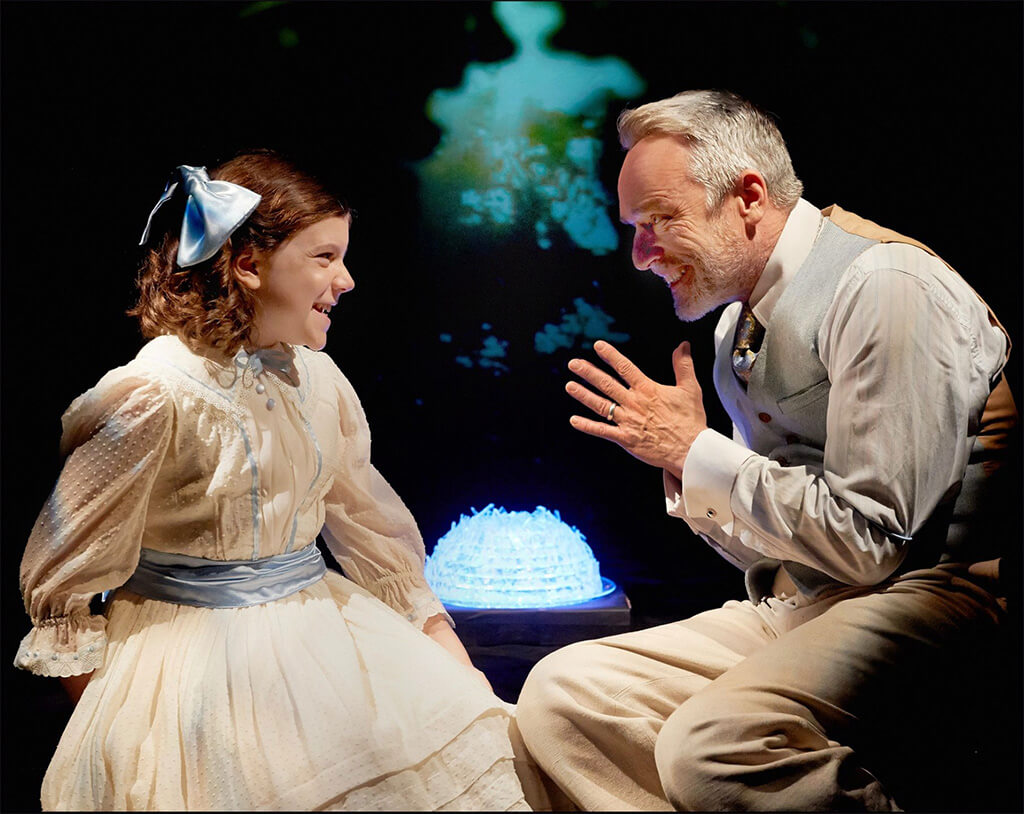
Coal Mine Theatre & Studio 180 Theatre: The Nether by Jennifer Haley, directed by Peter Pasyk, Coal Mine Theatre, Oct. 7 to Nov. 4. Tickets available at coalminetheatre.com or studio180theatre.com.
What happens when two acclaimed indie theatre companies, both with a penchant for plays on the edge, decide to co-produce a production? The answer is The Nether by award-winning, Los Angeles-based playwright Jennifer Haley.
Since its premiere in 2013, The Nether has been performed in 14 countries worldwide, so it clearly strikes a universal resonance. The play is also as provocative as it is insidious, as seductive as it is repellent. In short, The Nether is an unsettling theatrical experience that cries out for a fierce debate once it has ended. (My two friends and I were all on different sides of the core issues when we had our spirited post-play discussion.)
Haley is known for her canon of work that explores the ethics of virtual reality and the impact of technology on humankind. The time frame of The Nether is a shadowy future where what was formerly called the Internet has taken over human existence. Most people’s lives take place in the Nether where they go to school, work, and spend their leisure time. In fact, their offline lives (as being away from their computers is called) is practically non-existent.
An investigation unit has been established to police the Nether, hunting down realms of questionable ethics. As the play opens, Detective Morris (Katherine Cullen) is separately interrogating Sims (David Storch) and Doyle (Robert Persichini). She is hoping the latter, will give her information to take down the former. Sims’ Nether crime is running a realm called the Hideaway that allows players to engage in pedophilia, and Doyle has been a regular on the game site. The Hideaway is set in Victorian times and is peopled by a group of precocious and obedient children, all under the sway of Sims who is known as Papa. The questioning of the two men is interpolated by scenes that take place in the Hideaway where we meet Papa’s favourite child Iris (the astonishing young actor Hannah Levinson) and her client Woodnut (Mark McGrinder). To give away anything more about the twists and turns of the actual plot would be grounds for murder. The play is a police thriller after all.
We can, however, point to the ethical quagmire that Haley throws at us. On one hand, is it right to police imagination? We are told that all the Hideaway behinders (the players) are rigorously vetted to ensure that they are adults. Even the behinders who enact the children are adults, so essentially, while virtual adult/child sexual encounters take place, no actual pedophilia occurs. On the other hand, is it morally responsible to allow Sims to run a virtual moneymaking business that deals which such a reprehensible premise — the sexual abuse of children? This argument is just the tip of the iceberg in Haley’s exploration of the moral consequences of virtual reality.
Kudos to director Peter Pasyk who is turning out to be one of my favourite stagesmiths. His productions are clean and economical, while managing to be imaginative and visionary at the same time. In The Nether, designer Patrick Lavender has given Pasyk an inspiring set and glorious lighting. Considering that Coal Mine Theatre is a storefront on the Danforth with a postage size stage, what Lavender has created is a marvel. The interrogation scenes are black holes offset by glaring neon, while the Hideaway is like a gem-like diorama, a gorgeous pocket of light enhanced by Nick Bottomley’s lovely period projections. Richard Feren’s evocative sound and music score runs the gamut from the harsh static of the future, to the bucolic lilt of Victorian country tranquillity. Costumer Michelle Bohn has cleverly figured out how to get Sims/Papa from prisoner to Victorian gentleman, and back again, while her adorable, frilly white dress and petticoat for Iris is right out of a period cabinet portrait.
As for the acting, there is not one false note. Storch is wonderful, whether portraying Sims’ outraged sense of injustice or Papa’s loving Victorian father, while Persichini’s jaded Doyle strikes the right balance between defeat and defiance. Cullen’s character is the most monochrome of the lot, but she is suitably strident and aggressive in the role of Morris. When she finally gets a chance to add in emotional layers at the end, she shows the right stuff. The legendary actor/comedian W.C. Fields is credited with saying “never work with children or animals”, so the thankless task of playing opposite the prodigiously talented Ms. Levinson falls to McGrinder, and his Woodnut does do a very believable job of establishing a warm and sympathetic relationship with Iris. In fact, McGrinder only appears in scenes with Levinson, so he has a hard row to hoe. As for the young actor herself, Levinson’s bio lists a parade of credits that any long-established actor would envy. Her charismatic Iris literally commands the stage, and she keeps both Storch and McGrinder on their toes just holding their own.
Plays like The Nether that provoke a strong reaction in the audience are what makes theatre such a grand adventure.



